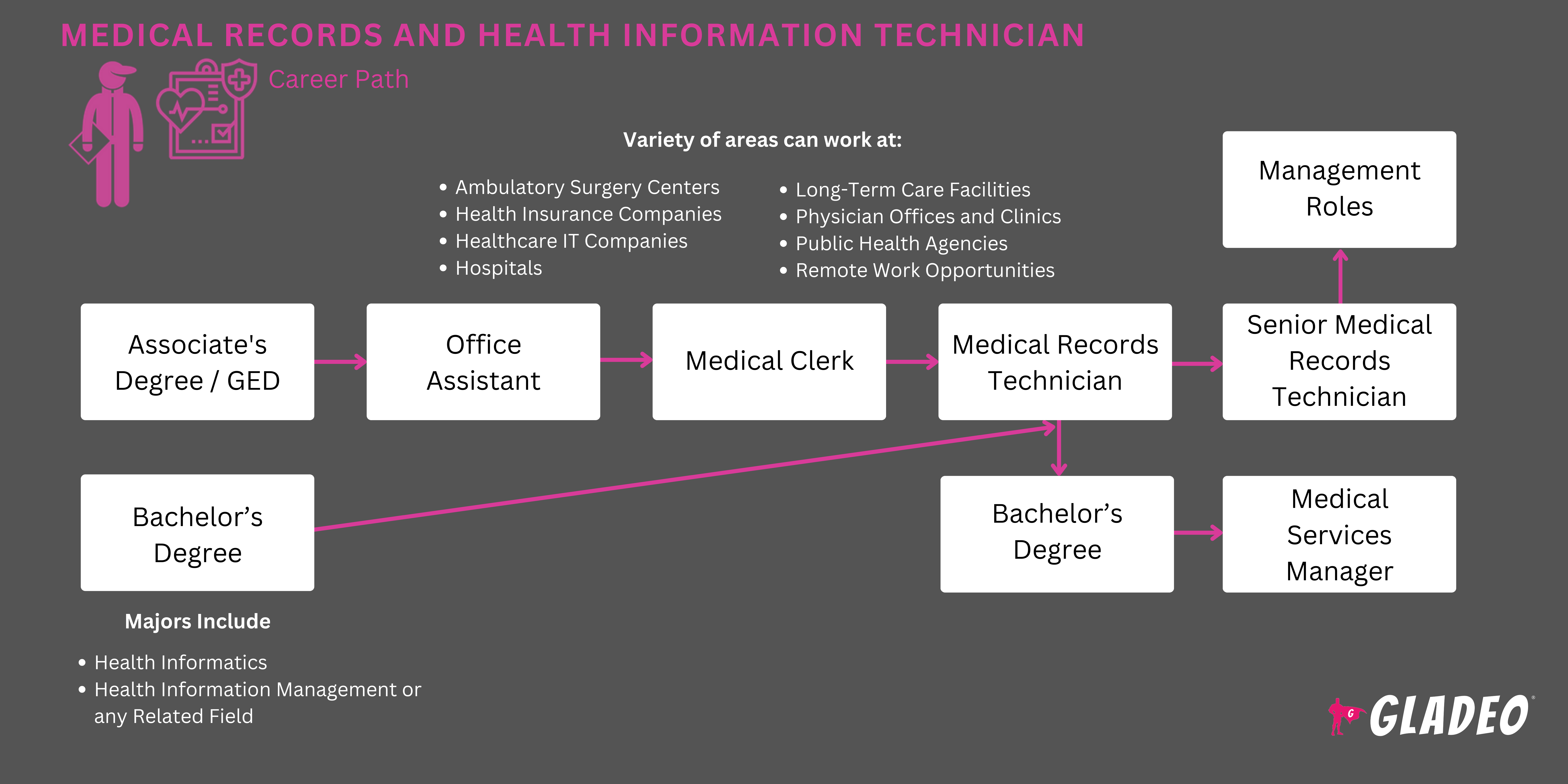Spotlights
Medical Records Analyst, Medical Records Director
Medical Records and Health Information Technicians are critical personnel responsible for keeping patient information protected, highly-organized, and accessible by the various persons and departments that need it. These include doctors, nurses, and other medical staff as well as insurance companies, all of whom workers may come into contact with on a daily basis.
Due to this work’s technical nature, employees in these fields must be extremely attentive to detail to maintain accuracy at all times. The jobs involve frequently utilizing internal medical codes that must be properly understood and applied correctly. Workers must be proficient in managing hard and soft copy files and using records management systems effectively. There are numerous federal and state laws and policies that apply to the safeguarding of sensitive medical information. That’s why Medical Records and Health Information Technicians must be devoted to learning and following all data privacy principles, especially in light of HIPPA regulations and the increasing use of electronic health records.
- Working within the hectic healthcare system to assist patients with their treatment and care
- Learning the “behind-the-scenes” of how medical facilities operate
- Gaining valuable skills and experience with protecting and managing sensitive medical information
Lịch làm việc
- Medical Records and Health Information Technicians typically work full-time and may be tasked to work nights, weekends, and holidays, depending on the facility where they’re employed.
Nhiệm vụ tiêu biểu
- Offer medical intake forms for patients to complete and return; prepare discharge forms
- Review forms for accuracy and completeness
- Process patient files and forms
- Enter personal data and history into a range of databases, special purpose registries, and other platforms
- Determine the proper disposition of files
- Assign and review internal and standardized clinical codes to various paperwork
- Work closely with clerical and medical staff, as well as administrators and managers
- Process medical billing claims and prepare forms
Trách nhiệm bổ sung
- Ensure confidential files are secured and protected against unauthorized disclosure
- Maintain hard and soft copy records management systems and follow best practices to keep files safe, organized, and indexed for easy retrieval
- Track patient outcomes and provide treatment data to authorized employees, as needed
- Collaborate with and answer questions from nurses, doctors, and other medical team members
Phân tích
- Compassionate and empathetic to patient needs
- Định hướng dịch vụ khách hàng
- Focused on details
- Độc lập
- Mức độ chính trực cao
- Kỹ năng tổ chức nhạy bén
- Kiên nhẫn
- Khả năng phục hồi và điềm tĩnh
- Security-conscious
- Phán đoán và ra quyết định đúng đắn, đôi khi chịu áp lực
- Strong communication skills, including active listening and clear speech
- Normal eyesight
Kỹ năng kỹ thuật
- Good with numbers and codes
- Familiar with accounting and billing software
- Excellent with records management and information security
- Comfortable using software related to business, science, and healthcare
- Adept at scheduling
- Strong computer and office equipment skills, including use of printers, scanners, and photocopy equipment
- Adept with speech recognition and dictation programs
- Bệnh viện và phòng khám
- Private practice offices
- Nursing homes
- Other admin, support, and technical areas
Medical Records and Health Information Technicians must be extremely diligent, methodical, and focused when dealing with forms and files. They’re expected to maintain a very high degree of accuracy while also ensuring all safeguards are implemented to keep information safe yet accessible to those who need it. Specific work locations may require evening and weekend shifts, as well as work during the holidays.
As citizens continue to live longer, their medical needs place increasing demands on busy healthcare facilities. Medical Records and Health Information Technicians will stay in high demand and be tasked with potentially larger workloads, in addition to being required to learn new technologies aimed at increasing efficiency and effectiveness. These workers are on the frontlines of data management and insurance billing. Those with demonstrated proficiency and advanced certifications may have greater job prospects.
Medical Records and Health Information Technicians tend to be analytical and may have enjoyed working with puzzles and figures. They’re highly organized and procedural, which are characteristics likely developed early on, perhaps due to high levels of household responsibility as children. They may have stood out in math or programming classes at school and enjoyed organizing activities and events. Workers in this field must also care deeply about the people behind the data and numbers, and so may have always had a strong urge to help others.
- A high school diploma and related work experience can be enough to get started in some cases, but usually, an associate’s degree or certificate is needed
- Medical Records and Health Information Technicians often take health-related classes in high school, as well as math, biology, and computer science courses that prepare them for certificates or associate degree programs
- Certificate or associate programs cover everything from relevant terminology, coding, classification, anatomy, physiology, health data standards, statistics, reimbursement processes, and technologies
- Tech training may include how to use: barcode readers, labeling printers, calculators, dictation software, encoding equipment, fax machines, light pens, credit card processing devices, medical charting accessories, microfilm viewers, shredders, scales, scanners, phone systems, tables, and more
- Optional certifications can be attained, such as:
- Certified Healthcare Access Associate
- Certified Health Data Analyst
- Certified HIPAA Administrator
- Certified Medical Reimbursement Specialist
- Certified Professional Medical Auditor
- Certified Revenue Integrity Professional
- Certified Tumor Registrar
- Healthcare Research Compliance Certification
- Home Care Clinical Specialist - OASIS
- Home Care Coding Specialist
- Home Care Specialist - Compliance
- Registered Health Information Technician
- Advancement may require a bachelor’s or graduate degree, depending on the position
- Associate’s degree offerings in Health Information/Medical Records or Medical Insurance Coding
- The school should be accredited, meaning it has undergone a quality assurance process to ensure it’s providing high caliber education
- Registered Health Information Technicians and Registered Health Information Administrators programs must be accredited by the Commission on Accreditation for Health Informatics and Information Management Education
- Consider how well the program might prepare you for additional certifications, such as those listed in the Education and Training section
- Always consider the cost of tuition as well as any applicable discounts, scholarships, or federal grants you may qualify for
- Think about your schedule and flexibility when deciding if an online or hybrid program is right for you
- Take high school classes to prepare you for your associate’s coursework or certificates, such as math, biology, and computer science
- Your associate’s should cover courses on medical terminology, coding, classification, anatomy, physiology, health data standards, statistics, medical reimbursement procedures, and the latest technologies and software platforms
- If applicable, ask your school nurse or medical personnel for volunteer opportunities. Any exposure you can get about "behind-the-scenes" processes can be helpful later
- Don’t neglect your “people skills!” Brush up on communications because once on the job, you’ll be dealing with stressed-out patients, busy nurses, and a range of insurance billing types
- Find volunteer or paid opportunities beyond the school grounds, such as at free clinics
- Start building your network early because you never know who’ll have tips on hot job openings
- Look for clubs and professional organizations where you can practice leadership skills and/or learn to work on teams

- It’s essential to keep track of everything you do academically or at your other jobs, especially those related to the position you’re applying to
- Document details for use on your resume, including statistics, figures, and impacts
- The harder you work in school and at extracurricular activities, the better your odds of standing out from the pack when it comes to applying for open jobs
- Carefully review the job advertisement and highlight relevant keywords to add to your resume
- Be sure to address every listed requirement on the job ad; don’t leave the hiring manager with any lingering questions!
- Every resume should be as perfect as possible, but especially for people who want to become Medical Records or Health Info Techs, you must ensure that every “i” is dotted and every “t” is crossed. If your resume is riddled with errors and typos, what will that convey about your work standards to the recruiter looking at it?
- Sign up for alerts on Indeed.com, LinkedIn, Glassdoor, and other job-seeking sites
- Use your network to learn about upcoming job openings, too!
- Read articles and stay up-to-date on trends and new developments so that you can speak intelligently about these things during interviews
- Check out Indeed’s 5 Medical Records Clerk Interview Questions and Answers blog
- Many job ads ask for recommendation letters or references, so speak with applicable connections within your network in advance to request letters or consent to list them
- As with most careers, one method of getting promoted is by finishing advanced training and certification programs or completing a degree
- Because these roles interface directly with patients, it is vital to demonstrate sincere caring, patience, and compassion for them at all times. Be a passionate patient advocate!
- Learn your position inside-out and transform yourself into an invaluable asset
- Offer to train new employees; create office policies, standard operating procedures, and training guidance
- Join professional organizations and stay up-to-date on recent developments
- Add value to every process you work with and look for ways to reduce inefficiencies
- Display the utmost professionalism at all times and be the example for others to follow
- Nurture your relationships with peers, medical staff, and management
- If errors occur, admit to them and offer solutions to fix them as soon as possible
- Earn the respect and trust of everyone you work with, and maintain integrity in all actions
Các trang web
- Học viện Lập trình viên Chuyên nghiệp Hoa Kỳ
- Hiệp hội quản lý thông tin y tế Hoa Kỳ
- Commission on Accreditation for Health Informatics and Information Management Education
- MB&CC
- Hiệp hội Healthcareer quốc gia
Sách vở
- Medical Records and Health Information Technician Career (Special Edition): The Insider's Guide to Finding a Job at an Amazing Firm, Acing The Interview & Getting Promoted, by Anne Johnson
- Registered Health Information Technician Exam Preparation, from the American Health Information Management Association
- Medical Office Professionals: A Practical Career Guide, by Marcia Santore
Within the wide world of healthcare, there are dozens of career paths to choose from! If becoming a Medical Records and Health Information Technician isn’t the perfect fit for you, don’t worry. The Bureau of Labor Statistics lists plenty of related occupations. Each has its own education and training requirements, so be sure to review these Plan B options carefully:
- Information Clerks
- Medical and Health Services Managers
- Trợ lý y tế
- Medical Transcriptionists
- Pharmacy Technicians
Nguồn cấp tin tức

Việc làm nổi bật

Các khóa học và công cụ trực tuyến

Kỳ vọng về mức lương hàng năm
New workers start around $41K. Median pay is $49K per year. Highly experienced workers can earn around $74K.




